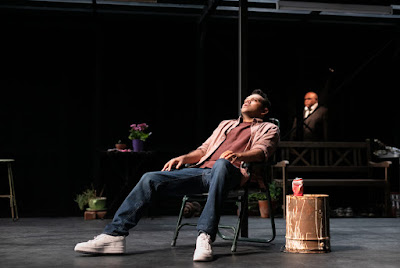City of Gold
Black Swan/STC/Perth Festival
Actor/playwright Mayne Wyatt wrote City of Gold in response to the death of his father (an activist leader) in 2015 and the killing of Elijah Doughty (a relative) in Kalgoorlie the following year. The play had its premier season with a QTC/Griffin co-production in 2019. Since then it's been seared into the national consciousness – not least thanks to an appearance on Q&A in 2020 that included a devastating performance to camera of a key monologue about racism from the play.
Meanwhile its significance has been underscored by the police killings of Kumanjayi Walker in the Northern Territory and George Floyd in the United States, as well as numerous other Black and Aboriginal deaths in custody, on the streets and in their homes. Just last week, the officer who shot and killed Walker was acquitted of all charges (no police officer in Australia has ever been convicted for the death of an Aboriginal person). The words ‘I can’t breathe’ are even uttered by one of the characters in City of Gold while he’s being knelt on by a policeman at the climax of the play. Wyatt's character in the play is named Breythe Black.
Now a new Black Swan/STC co-production directed by Shari Sebbens (who was in the cast of the original production) has finally opened at the Heath Ledger Theatre as part of Perth Festival for a foreshortened 10-day season, after delays due to Covid-related precautions.
The term ‘foreshortening’ also describes the form and content of the play. As in Mantegna’s Lamentation over the Dead Christ, City of Gold deals with the aftermath of death in a way that is up close and personal, and the compression of perspective creates a dramatically heightened effect. This is intensified by the writer playing the lead role in a semi-autobiographical play focussing on a family in Kalgoorlie who are dealing with a double bereavement. The action is also compressed into several days, from the moment when Breythe learns of his father’s death until the funeral; and it occurs mostly in one place (on the front porch of the family home).
This sense of compression is both a source of play’s strength and some of its weaknesses. Dramaturgically it suffers from the somewhat forced yoking together of two main plotlines: the death of Breythe’s father from cancer and the simultaneous but coincidental killing of a relative at the hands of white vigilantes, which leads to protests and further violence, culminating in a slightly implausible and melodramatic counter-vigilante kidnapping orchestrated by Breythe’s brother on the eve of the funeral.
There’s also a hilarious subplot about an Australia Day lamb ad in which Breythe (also an actor) is starring (based on an actual ad in which Wyatt appeared in 2017). This adds another layer of autobiographical content, satire and dramatic irony, as Breythe initially walks out of the shoot in disgust but subsequently needs the money in order to pay for the funeral expenses. The ad-shoot scene that opens the play (staged and performed in a heightened style) is a cringe-comic theatrical coup; and the recut version screened after interval is an incisive collage worthy of Richard Bell or the best of contemporary Indigenous satirical film and TV.
Finally there are also a series of memory-scenes and dream-sequences involving Breythe’s dad (imposingly played by Trevor Ryan). These were less successful for me, as they felt slightly trapped in sentimentality and didn’t quite reach the same heightened level.
In general, the play is a little overstuffed with content and overwritten in style, with stretches of exposition, invective or diatribe that could almost be delivered straight to the audience (and memorably was, in the case of the aforementioned monologue on Q&A, which is launched in the production from the roof of the family veranda, to similarly devastating effect). However, the rawness, energy, urgency and impact of the writing and acting more than make up for the play’s occasional excesses. Wyatt dominates the stage, his finely-tuned and physically agile performance infused with emotion (primarily grief and rage) in a way that makes it difficult to separate the character from the actor/playwright or acting from reality. He’s supported in this by the rest of cast, especially Matthew Cooper as Breythe’s brother Matteo and Ian Michael as their deaf and emotionally vulnerable cousin ‘Cliffhanger’.
Tyler Hill’s set effectively frames the work with a skeletal outline of the family home represented by a series of ‘house-shaped’ cross-sections of black flyscreen – with corridors between them through which characters can appear in the dream-sequences (starkly lit by Verity Hampson) – leading to a more naturalistically detailed veranda covered by a transparent Perspex roof. Rachel Dease’s sound design punctuates the scenes a little heavily at times but mostly weaves unobtrusively through the work and adds to the prevailing sense of unease.
City of Gold makes some powerful and necessary statements about racism in Australia today. It speaks with the voice of a younger generation of Black and First Nations artists and activists around the world, who are angry and impatient with progressive pieties as well as the ongoing violence of White colonialism. It’s also a powerful example of actor/writer-driven theatre. Its main plot resembles a semi-autobiographical memory-play like The Glass Menagerie, as well as a genre of plays about returning home and confronting the past that stretches from the Oresteia to Pinter’s The Homecoming (the ‘haunting’ of Breythe by his dead dad also recalls that greatest of all ‘homecoming’ plays, Hamlet). The genre arguably lends itself to contemporary Aboriginal theatre (Jimmi Chi’s Bran Nu Dae and David Milroy’s Panawathi Girl being two recent examples) as well as contemporary Australian theatre generally because it involves a reckoning with history and Country which is long overdue.

No comments:
Post a Comment